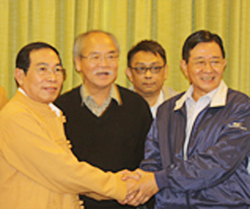More than 3 months after the ceasefire agreement was signed on 2 December, the Restoration Council of Shan State / Shan State Army (RCSS/SSA) is still unable to implement the terms of the agreement much, according to SSA sources.
 “What we have achieved thus far is ceasefire to a certain extent and the setting up of liaison offices in the main cities,” said Maj Lao Hseng, the movement’s spokesman. “Resettlement of the IDPs (Internally Displaced Persons) is still at a standstill.”
“What we have achieved thus far is ceasefire to a certain extent and the setting up of liaison offices in the main cities,” said Maj Lao Hseng, the movement’s spokesman. “Resettlement of the IDPs (Internally Displaced Persons) is still at a standstill.”
The second agreement signed on 16 January designated two sub-townships, Homong and Monghta, opposite Thailand’s Maehongson and Chiangmai, for resettlement of the nearly 3,000 IDPs residing near the 3 border bases of the SSA.
The SSA’s plan was to establish military bases around locations suitable for resettlement before moving the IDPs to the said locations. “They are not going to move an inch until we can ensure their security,” he said. “At present, they are still afraid of the Burma Army.”
However, the Burma Army has rejected every location chosen by the SSA to set up bases. “They only want us to stay where they want us to,” he said. “Our troops say they are being treated like enemies who have surrendered (to the Burma Army).”
He said the movement will nevertheless continue to resort to negotiations to resolve differences unless attacked. “The ceasefire agreement notwith standing, the standing order is we will always shoot back if we are attacked,” he said.
There has been at least 13 clashes between the two sides, the last 2 on Sunday, 11 March. The Karen National Union (KNU), that has signed the ceasefire agreement on 12 January, has also protested that the Burma Army is breaching the ceasefire, according to an Irrawaddy report yesterday.
Since 18 August, when Naypyitaw extended an official invitation for peace talks, 10 armed movements have met its envoys and concluded ceasefire pacts as the first step toward an inclusive political dialogue.


